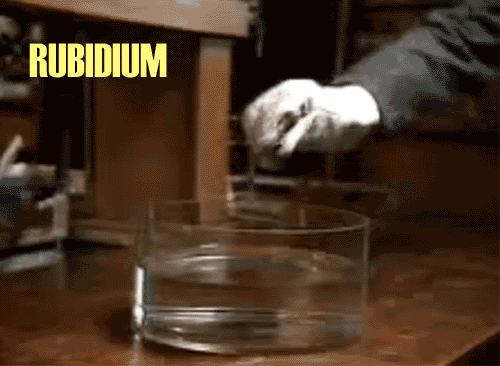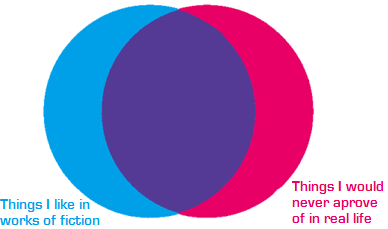Particolored-arts - It's A Work In Progress

More Posts from Particolored-arts and Others

LES MIS RULE 63 Gina Torres as Inspector Javert
Some police officers have a peculiar expression, combining an air of meanness with an air of authority. Javert had this, without the meanness.
The peasants of the Asturias believe that in every litter of wolves there is one pup that is killed by the mother for fear that on growing up it would devour the other little ones.
Give a human face to this wolf’s whelp, and you have Javert.
Javert was born in a prison. Her mother was a fortune-teller whose husband was in the galleys. She grew up thinking herself outside of society, and despaired of ever entering it. She noticed that society irrevocably closes its doors on two classes of people, those who attack it and those who guard it; she could choose between these two classes only; at the same time she felt that she had a powerful foundation of rectitude, order, and honesty based on an irrepressible hatred for that race to which she belonged. She entered the police. She succeeded. At forty she was an inspector.
Her face consisted of a regal nose, broad cheekbones, and deep brown eyes. One felt ill at ease on first seeing her thick eyebrows and strongly defined nose and lips. When she laughed, which was rarely and terribly, her voluptuous lips parted, showing her teeth. When she laughed, Javert was a tiger; strange, majestic, terrifying. Beyond that, she had an oval face, a square jaw, thick black hair that fell over her shoulders, between the eyes a permanent central crease like an angry star, a gloomy look, and an air of fierce command.
@fantineweek 2018 - day two: gold.
once more we are going off the hapgood translation available here.
i guess i could technically put this under the “sacrifice” prompt, but ... i honestly think that her hair alone is its own category.
two things related to fantine’s hair which account for a lot of symbolism in her story: the fact that it is gold, and the fact that she sells it.
so starting off with the fact that it is gold --
i haven’t seen many of the movie adaptations -- in fact i am avoiding the liam neeson & uma thurman one like the plague, for probably obvious reasons -- but in lm 2012, and the 25th anniversary cast, we basically see that cosette’s hair color and fantine’s hair color is switched. the same thing will be true of the bbc miniseries. it’s basically only staged productions that i’ve seen that stay true to the book.
this bothered me for a while, and at first i thought the only reason it bothered me was because i am a stickler for details. marius ought to have dark hair, grantaire ought to be ugly, the barricade is on rue de la chanvrerie not rue de villette, musical, i don’t care if it doesn’t rhyme.
except ... well, hugo writes these things, even the smallest of details, for a reason. marius has dark hair because he is a Romantic, which is associated with melancholy, and you can’t very well have a byronic brooding sort of fellow with golden hair. and you can see the same care for details with his physical descriptions of grantaire, enjolras, éponine, et cetera. there’s an element of symbolism involved.
he writes the fallen woman, fantine, with long golden hair.
this being western society, and all the issues that it entails, blond hair is associated with not only beauty but purity. we give princesses like rapunzel and cinderella blonde hair; we give prince charming blond hair; we give stained glass angels blond hair.
in the picture of dorian gray, oscar wilde gives dorian blond hair to emphasize the fact that he hides under an image of purity to conduct his evil deeds. he uses the trope of blond hair = purity to turn our character expectations upside down.
hugo gives fantine blonde hair, and tells us she is innocent; tells us she works hard; tells us she is good. then he shows us how society devours her, starting with her blonde hair. he uses the trope, and the expectations that follow that trope, to show the reader (who at that time would have been a bourgeois not unlike tholomyès or bamatabois) that despite her abasement, fantine never deserves what happens to her.
hugo is intent on hammering it into our heads that she never actually did anything wrong, and he uses her hair as a symbol for her purity and innocence.
she sells that pure golden hair herself.
-- which brings me to my second point.
in the musical, it is the wigmaker who approaches fantine. it is the wigmaker who tells her what pretty hair she has, and how much money she can make by selling it. fantine is reluctant -- she stubbornly digs in her heels at first, she is horrified by the prospect (and rightly so!). it is only the thought of cosette which forces her to accept the wigmaker’s offer.
i can’t find a picture of it, so let me describe what i saw at the us tour:
fantine, wrapped in a shawl, on the left. the wigmaker, stage center, a crone, hunched over -- and at the words “ten francs may save my poor cosette,” she raises her right hand in a slow arc towards the ceiling, holding her shears aloft -- the shears are open, the moment is predatory triumph, and as soon as the note ends she practically leaps upon her victim to drag her offstage.
this scene gives us the hungry jaws of society which devour fantine. it’s horrible. but the book gives us something even more horrifying, for all that it’s brief.
from “result of the success” :
One day they wrote to her that her little Cosette was entirely naked in that cold weather, that she needed a woollen skirt, and that her mother must send at least ten francs for this. She received the letter, and crushed it in her hands all day long. That evening she went into a barber’s shop at the corner of the street, and pulled out her comb. Her admirable golden hair fell to her knees.
“What splendid hair!” exclaimed the barber.
“How much will you give me for it?” said she.
“Ten francs.”
“Cut it off.”
within twelve hours of receiving the letter, she has willingly given up her hair for the sake of her child.
her hair: the symbol of her purity.
okay, pretend we’re talking about an actual human being and not a character for two seconds.
she is known, earlier in the book, as fantine la blonde. part of her identity is taken up by the fact that she has this glossy beautiful hair.
this hair falls down to her knees. her knees.
this? (source)

is a LOT OF HAIR.
and it STILL doesn’t even come down to the knees. this is maybe just over HALF as long as fantine’s hair is.
my hair used to go down to the middle of my back before i had it cut off in a pixie in 2016. so without realizing it i sort of did a mini fantine ... you know, sans the rest of the trauma that goes along with her entire situation.
my hair only went to the middle of my back. call that 2.5, 3 feet of hair total. it was long enough that if it was loose, it would get caught in my armpits if i wasn’t paying attention. (super glamorous, right?) i can only imagine what having hair like that ^ would be like, let alone hair that goes down to the knees. long enough to sit on, for God’s sake!
hair that long has to be maintained daily. combing it, washing it, drying it, making sure it doesn’t tangle, making sure it doesn’t get caught in things and snap off, getting rid of split ends. braiding it, learning different hairstyles, all the little accessories like pins and combs and brushes. it’s practically its own hobby -- and when we consider that this is the only pleasure left in fantine’s life, that she spends the entire rest of her day sewing piecework ...
i had my hair cut to a pixie and everyone in my life who knew me before the pixie cut went crazy over it. part of a woman’s identity is in her hair, and there are other writers more articulate than i am who will happily talk at length about how different hair lengths make society perceive you in different ways. feminine, masculine, whatever. i’m not here to talk about that part. i’m talking about how her hair, her long hair which was a part of her identity simply because of its length, is also a part of her body.
man, i got my hair cut to a pixie on purpose, because i wanted to and because i thought it would be a cute low-maintenance haircut. there was no emotional turmoil involved in that decision. i made it willingly, and i had been looking forward to it for a few months. yet even then -- even now, two years later when my hair’s grown down past my shoulders again -- i still miss having hair down to the middle of my back.
fantine has no time to contemplate that decision. she does not want to make that decision. she is poor, she lives off practically nothing, and combing her hair is the one thing left in her life that affords her some happiness. her hair is the only beautiful thing left in her life.
one thing the lm 2012 movie did right is it showed fantine’s face during the haircut, and anne hathaway looks like she’s a split second away from bursting into tears. there is an element of trauma here. i can only imagine that fantine spends a fair few nights crying over that loss, and she would be justified in doing so.
it’s after the loss of her hair that she falls into anger and bitterness. this was the last bit of joy in her life, and she has sold it away willingly.
nobody makes the decision for her that her hair is worth selling. nobody gives her a choice to make that she can decline or accept. she comes up with the idea on her own.
to take an image from little shop of horrors, she chooses to step into the monster’s mouth.
this is a literal way that fantine sells herself, months before she becomes a woman of the town. the way she becomes a prostitute is exactly the same: no pimp approaches her, no women in the chorus tell her she’ll make easy money. she comes to the conclusion herself, and she takes that final step.
from “christus nos liberavit” :
Misery offers; society accepts.

Modern Les Amis AU : Combeferre/Joly
So you just need to breathe/To feel my heart against yours now, against yours now
Saying Fantine 'got out of the gutter' is a bit of a stretch, no? She's a factory worker paying a couple to house her child, and is forced by circumstance to become a prostitute the moment she's fired. She dies of a venereal disease at twenty-some and is buried in an unmarked grave. That's hardly out of the gutter. Javert makes what is a deeply unlikely ascent, but an ascent nontheless: he's born in prison and becomes a police officer with a steady income. He definately rises higher than Fantine ever did, even if he started a bit below. Of the three, Valjean rises the highest, out of a combination of sheer luck and trickery.
ok, i haven't posted on this blog in ages, but here we go. i agree that she definitely died in the gutter, and didn't have all that far to fall back in. it was a very tenuous situation! that's part of the whole point of her story, how thin the breaking point is. ditto javert and valjean. if you think javert lived in anything but poverty even while licking the boot, well. to say nothing of valjean and his whole Deal (tm). they're three faces of the same problem! in this valvertine essay i will
but i have difficulty with the idea that she didn't make it out even a little. there's a bit in the brick where her neighbor marguerite has to teach fantine how to live off nothing, like making her petticoat into a coverlet and so forth -- which is to say, as a kid fantine knew how to live on nothing, but at some point in her paris life, she forgot, because she wasn't living on nothing. she had a job as a piecemaker, which didn't make her Not Poor but it did give her enough to like, you know. have a little left over to buy millet to feed birds at her windowsill, and spend the time it takes to care for her appearance (which when you have hair that falls to your knees is nothing to sneeze at). she could afford the kind of personal maintenance that would accent her natural beauty and catch a law student's eye. and even after tholomyes dumps her, even though she has to give cosette up, at the factory she is still making a living! not law-student-allowance living, but still! one of her lines at her arrest, that sticks with me a lot, is 'i used to have linens, so many linens.' you know? a fall hits harder if you make it off the ground first.

((Anon let me tell you something.
I am by no means the most attractive person on here. Some people think I am, okay yes fine. But there are plenty of people on Tumblr and in the world who do not think they are pretty when they actually are.
Ask-the-god-of-mischief? She's really pretty.
Raincanthurtmenow? Also a very pretty mun.
Those are the first two off the top of my head but let me tell you there are plenty more, and they all add captions saying "sorry for my face" and "I'm not attractive at all".
Which is a fucking crime.
You know why? Because these people are not used to being told they're pretty. Because clearly there is a voice in their head saying that they are not.
I know I have that voice in my head. It whispers the same thing every time I look in a mirror.
But the thing is to be strong, the thing is to move past that evil little voice telling you you are not good enough. The thing is to know, personally, that you are pretty and you are worth it and you are strong, no matter what the haters say, even if the hater is in your head. Especially if the hater is in your head.
I'll stop ranting now.))

Say what you like. Plutonium may give you grief for thousands of years, but arsenic is forever.
Pollution, the 4th horseman of the apocalypse from Pterry & Gneil’s Good Omens.

The Death of Grantaire and Enjolras Et, se tournant vers Enjolras avec douceur, il lui dit: – Permets-tu? Enjolras lui serra la main en souriant. Ce sourire n’était pas achevé que la détonation éclata. Enjolras, traversé de huit coups de feu, resta adossé au mur comme si les balles l’y eussent cloué. Seulement il pencha la tête. Grantaire, foudroyé, s’abattit à ses pieds. Enjolras by me and Grantaire by @vanille-francaise
-
 particolored-arts reblogged this · 6 years ago
particolored-arts reblogged this · 6 years ago -
 starwarsepisodeiv reblogged this · 6 years ago
starwarsepisodeiv reblogged this · 6 years ago
Unofficial art/writing blog for particolored-socks. Updates once in a blue moon.
265 posts






